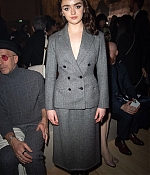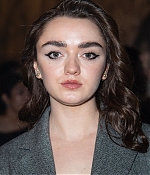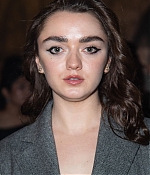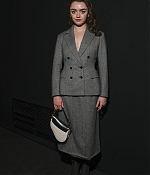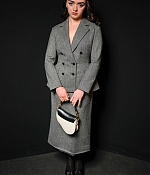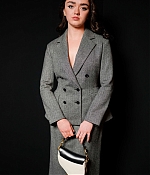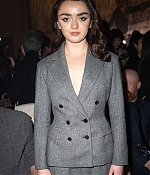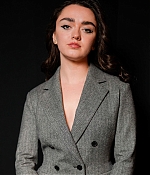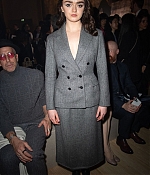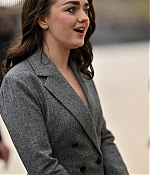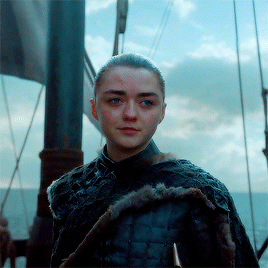

Freddie Highmore and Maisie Williams will star in an adaptation of a bizarre true story about an American ex-beauty queen who was accused of kidnapping and sexually assaulting a Mormon missionary in England.
Entitled “Sinner V. Saints,” the movie is directed by Tim Kirkby (“Fleabag,” “Veep”) and will be sold by WestEnd Films, which is shopping the project to buyers in Cannes next week. The film will begin shooting in the first quarter of 2023 in the U.S. and U.K.
Set in 1970s Los Angeles and London, “Sinner V. Saints” is based on the true story of Joyce McKinney, who went to extreme lengths to stop the Mormon church from taking away her sexual obsession: a nebbish Mormon missionary named Kirk Anderson. The sordid relationship — which was the focus of the 2010 Errol Morris documentary “Tabloid” — went awry and eventually resulted in accusations of kidnapping and sexual assault against McKinney.
Mark Williams and Andriana Williams are producing.
“It’s rare to find an over-the-top true story with compelling characters and zany twists and turns like this,” said Andriana Williams. “The all-consuming passion, absurd lawbreaking, and outrageous antics made news around the world then and can be sure to entertain today.”
Kirkby added: “I’ve never read a more no-holds-barred fever dream of a script that whisks the reader on a journey of sex, obsession, and rock ‘n’ religion like ‘Sinner V. Saints.’ Obsessive, first love is a magnificent premise, and sprinkle on top a killer true story involving abduction, quirky supporting characters and the era of free love, and you have a cocktail of something very potent. It is a pleasure to roll around in the world of our anti-heroine Joyce McKinney.”
The script is written by Jill Hoppe and based on the book “Joyce McKinney and the Case of the Manacled Mormon” by Anthony Delano.
Maya Amsellem, managing director of WestEnd Films, said: “‘Sinner V. Saints’ takes us on a riotous journey, and we were immediately captivated by Jill’s witty script which brings this incredible true story to life. Combining this with Tim’s exciting directorial vision, we are sure this crazy, colorful film will surprise and delight audiences worldwide.”


W Magazine-On Friday, April 29, the actress Maisie Williams attended the Thom Browne fall 2022 runway show sporting bleach blonde and black hair and a gray corset with white piping. To most, the Game of Thrones star appeared to be wearing a completely innocuous—if not terribly chic—outfit. But in reality, Williams was giving a subtle hint toward what she planned to wear to the Met Gala three days later. “It was definitely a precursor,” she says on the morning of May 2 from outside her New York City hotel. She’d planned to give onlookers a taste of the “sculptural, voluminous” Thom Browne gown she’d chosen from the designer’s fall 2021 collection by nodding to its white corseted bodice. Only those truly in the know would have picked up on the sneaky reference, but it gave Williams a little thrill nonetheless. “I wanted to foreshadow what’s to come,” she adds.
The look she chose for the Met Gala—a black floor-length skirt adorned with small buttons and sharp pleats, a matching bolero, and that white corset—was right in line with the Gilded Glamour theme, in addition to Williams’s own personal style, which she describes after much deliberation as “transparent, tailored, and expressive.” The gown, which first appeared on Thom Browne’s runway worn by a male model, received a full custom treatment: the actress wore the cropped jacket off the shoulders and added a pair of the kooky, block toy platforms that debuted at the designer’s fall 2022 show for footwear. “What drew me in when I first saw this look was the contrast between the feminine structure, but also the powerful volume of it,” the actress says, adding that it was “the perfect blend between masc and femme.” The first time she tried it on, the outfit became a source of inspiration. “When I saw it, the ideas that it then inspired for hair and makeup just started tumbling out of my mind. When you have an outfit that’s so strong, but that’s also so versatile, it gets you excited to think about the full look.”
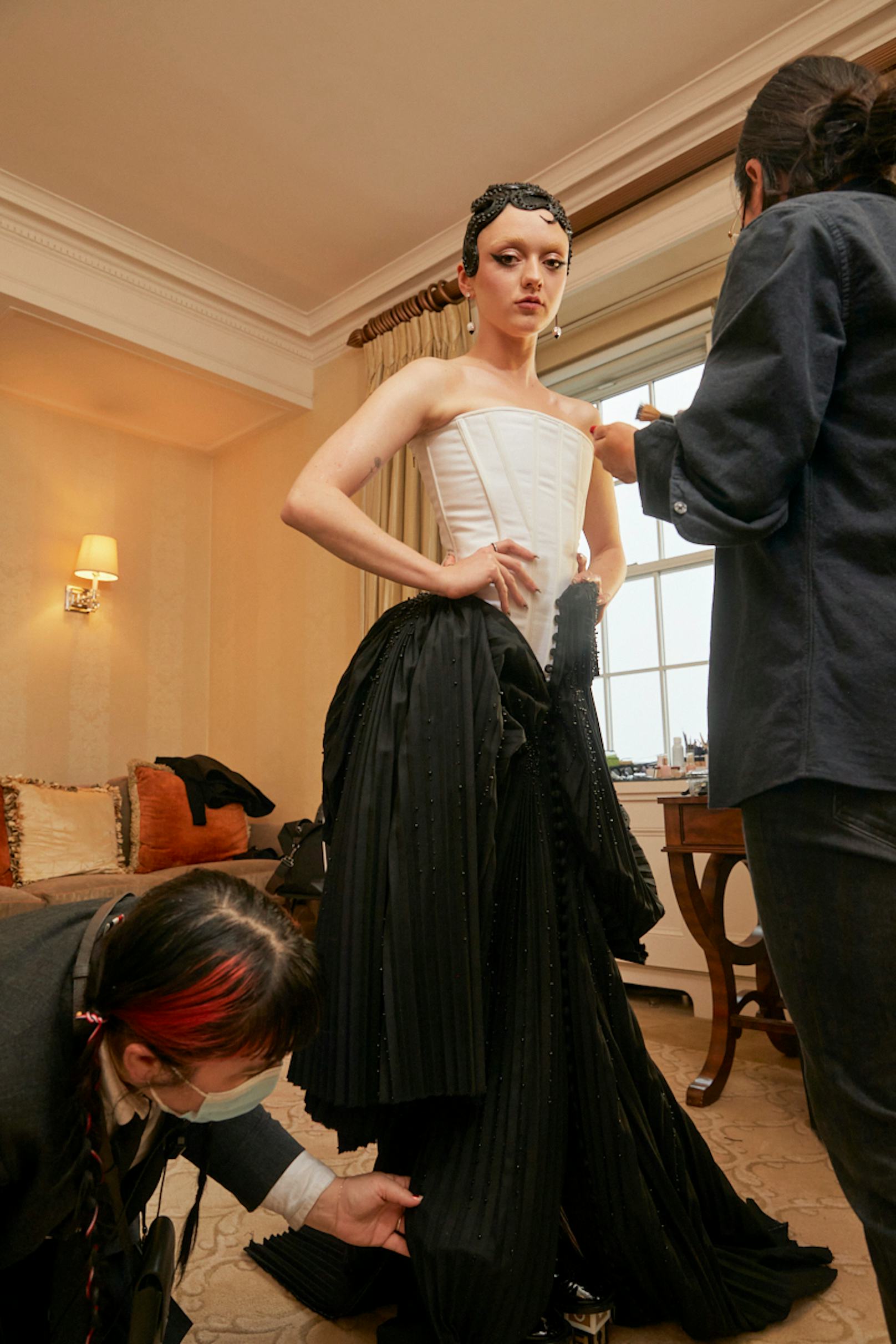
Williams had every intention of keeping the getting ready process low-key. “I think everyone will get to the hotel around 1 PM, which gives us four hours,” she says, “but I just cannot sit still for four hours.” However, this is the Met Gala—everything’s always over the top, as Williams herself admits. In her hotel room, a fleet of Thom Browne associates dressed in the designer’s signature shorts suits hemmed and made adjustments during the final moments before Williams was due on the red carpet.
It was a distinct departure from the first fitting she’d done the prior week at Browne’s atelier. “Thom was not present for the fitting, however he had given a lot of his thoughts and ideas on how it should be styled, the way that the jewelry should be,” Williams recalls. “I felt grateful that there was that trust that we could have this fitting and he didn’t need to oversee it with his eagle eye.” Williams is no stranger to the label—in fact, the most prized possession in her closet is a Thom Browne piece. “It’s a cigarette-colored, camel trench coat, but it’s very fitted,” she says. “It fits me so perfectly that I can get away with wearing something underneath that might not be quite hitting it, but with the coat, it’s elevated.”
But a trench, a staple item in any fashion enthusiast’s closet, doesn’t even come close to what Williams’s Game of Thrones character would wear. When I ask what the actress thinks Arya Stark might choose as a getup for the Met, Williams immediately has an answer on deck. “Arya would wear Loewe, which has recently done the dress with the big metal plate,” she says. “She’d have drawn some inspiration from being tough, and could protect anyone who needs help—or assassinate anyone that got too close.”


From fan-favourite murderer in Game of Thrones to raucous punk icon in Pistol, Maisie Williams is burning her own path through the world’s misconceptions.
Maisie Williams leans back into a white leather sofa in a London studio, hard to miss with her bleached hair and eyebrows to match. Marine Serre moons decorate her arms and a black beret and Coperni bag sit by her side. There are too many wardrobe must-haves on the 24-year-old actor to take note of as we introduce ourselves and Williams talks about her continuing battle with car sickness – an issue exacerbated by her drive into the capital.
Most notable about her attire, though, is her black T-shirt, which reads, or rather shouts, “The Sexy Young Assassins” – a tribute to one of the most iconic, society-rupturing bands there ever was: the Sex Pistols.
The band rose to prominence during a period of rage, anti-fashion, drugs and uprooting traditional values. The Sex Pistols’ second single, God Save the Queen, was released in 1977, the same year as the Queen’s Silver Jubilee, and was promptly banned by the BBC and most independent radio stations. Their only album, Never Mind the Bollocks, Here’s the Sex Pistols, reached the number one spot on the UK charts. And probably the most recognisable name of the era, Sid Vicious, the band’s bassist, died of a heroin overdose two years later. It was a whirlwind epoch that made a long-standing mark on British culture.

She has come straight from something the industry calls ADR – a process of polishing up dialogue in rowdy scenes. And judging by the leaked images of the cast on set, the outfits, the glam and what we all know of Britain’s punk era, rowdiness will no doubt be taking centre stage in the show.
“[Boyle] creates an atmosphere – more than any director I’ve ever worked with – of authenticity,” Williams says excitedly. “If something looks chaotic on screen, it was chaotic on the day. If he wants people to be scared, there’s a sense of adrenaline on set. If he wants people to lose their minds and scream and shout, the whole atmosphere is tense and high stakes. He will not compromise on that, ever.”
Pistol isn’t set to be a normal biopic. Sure, it’s based on guitarist Steve Jones’s memoir, Lonely Boy: Tales from a Sex Pistol, and focuses on band members Sid Vicious (played by Louis Partridge), Johnny Rotten (Anson Boon), drummer Paul Cook (Jacob Slater) and the band’s manager, Malcolm McLaren (Thomas Brodie-Sangster). However, Boyle’s exploration of the time goes beyond the band, pulling in other names that are synonymous with punk.
Iris Law plays Soo Catwoman, known for her signature hairstyle of flared “ears” dyed black against the rest of her bleached crop, which managed to retain an almost unobtainable level of uniqueness, despite the constant search for originality at the time. Dylan Llewellyn has been cast as Wally Nightingale – the original guitarist in the band that became the Sex Pistols, who was ousted by McLaren for not fitting the image he wanted. Williams herself plays punk icon Jordan (real name Pamela Rooke), whose powerful look came to define the identity of punk culture, making her a figurehead. Rooke took her moniker from Jordan Baker in The Great Gatsby, a character known for her alluring nature and deceit. But worlds away from F Scott Fitzgerald’s character, Rooke transformed from a teenager who lived and breathed ballet in the picturesque town of Seaford on the English coast into the mother of punk as we know it.


Jordan became increasingly prominent on the scene, thanks to her job at Vivienne Westwood and Malcolm McLaren’s shop on the King’s Road in Chelsea, London, which by that point was called Sex. Photos of her scattered around the internet personify the younger generations’ idea of what punk really was, how it felt and who moved within those circles. There’s a gnarliness to them, an up-turned lip here and there, the cultural revolution visible in the background.
Even though Williams is dressed the part on the day of our interview, you wouldn’t quite characterise her with well-used punk terms like “antichrist” or “anarchist”. Indeed, her quiet laughter after making jokes and her poised, thorough answers indicate the opposite. But then again, looking at the actor, you probably wouldn’t have expected her to be slitting throats while on a murder-fuelled rampage across Westeros as Arya Stark in Game of Thrones either. And that’s what, from the first ten minutes of our chat, seems to be the most compelling aspect of the actor: her ability to shapeshift, to transform into characters that appear to be so far removed from who she really is, whether by nature or time period.
It was through the cunning, independent and fierce character of Arya that most of the world got to know Williams while she was in her early teens – it’s a role that needs little context or background information. She became a fan favourite, especially towards the end of series eight, when she killed the Night King, essentially saving most, if not all, of the other characters in the behemoth show. But beyond the screen, and beyond playing a character that was in many ways very different from her, she was a young girl trying to navigate adolescence through keeping her two lives separate.
“I surrounded myself with people who either hadn’t watched [Game of Thrones], didn’t really care about the show, or did care about the show but didn’t want to talk about it. With people who weren’t really interested in that world,” the actor says of how she spent her downtime while filming the show. “I really felt like Hannah Montana, with it one half of my life. Slowly, as I’m getting older, I feel those two parts of myself becoming one again, but I think, to get through it, I tried to section off my life between the two things.”

“The part that makes you grow up quickly is the part of the industry that asks you to be aware of yourself,” she says. “You know how teenagers go through phases – it’s really hard to do that when you’re in the public eye because, week to week, you can be contradicting yourself. So as soon as I said something, I was like, ‘OK, that’s who I am,’ and you move further and further down the path of someone that you think you’re supposed to be.”
Now, instead of trying to shape herself under the world’s gaze, Williams is approaching identity with a more nonchalant outlook that acknowledges differing opinions and doesn’t try to appeal to everyone. “I’m happy for people to just see me the way that they see me. I can’t control it. That’s the thing about identity – the more you try to actually shape that, the less people respond to it. So whether people think that’s vanilla and boring or cool and interesting, it’s kind of out of my control,” she says, smiling.
It would be hard to ignore the fact that Williams’s outlook on identity, of wanting to burn her own path through life regardless of what others say or think, is characteristic of the punk movement. It’s a newly adopted perspective that may have been the result of her being so intimately involved in recreating that world. Or rather, it could have grown out of the close relationship that formed between her and Jordan, who was one of the only consultants on the show from the punk era. The two worked closely on hitting the nail of authenticity firmly on the head, with Jordan giving insight into what people wore, where everything took place, and the relationships that string the characters in the series together.
At first, Williams didn’t believe she had much in common with Jordan: their two worlds ostensibly seemed quite removed from each other. But what they may have lacked in similarities when they were first acquainted, they eventually made up for in affinity, and an understanding that other people’s perceptions of you aren’t gospel. Williams came to realise that what united her with Jordan was that they have been continually misunderstood through life. The world saw them the way that it wanted to see them, before they had a chance to open their mouths.
“It wasn’t until I was in that situation that I realised this is maybe what Jordan felt like – that it was actually just who she was and she was doing what she knew. But that can be interpreted as anything when people don’t really know you,” Williams says.
Perhaps relinquishing control over how you are perceived by others is something that Williams learnt from Jordan. Or maybe the time was right for Maisie Williams to slip into the skin of a punk legend and to command the character with the same force that she now commands her own life with… All rooted within the constant reminder that her identity is hers for the sculpting, and to never, ever mind the bollocks.
HUNGER MAGAZINE
Photographer Rankin
Writer Ry Gavin
Stylist Kamran Rajput
Makeup Artist Jesse Walker at Eighteen Management using Charlotte Tilbury Beauty
Hair Editor Nick Irwin using SCHWARZOPF Professional Session Label
Manicurist Jade Ford at Beautii
Hair Assistant Ellie Bond
Photography Assistants Charlie Cummings, Doma Dovgialo, Chelsea Nawanga, Marcus Lister









From wielding a sword on Game of Thrones to redefining the face of modern beauty on the red carpet, MAISIE WILLIAMS has long harnessed the power of her own femininity to break down barriers and confront cultural stereotypes. Now set to star in Danny Boyle’s hotly anticipated punk-scene series, Pistol, the actor is staging another, quieter act of anarchy in the British countryside – and, as she tells NAOMI PIKE, she’s never felt happier
On
a sunny spring morning in the middle of rural West Sussex, in the south-east of England, Maisie Williams is extending into a warrior pose on the mat next to mine. She and her boyfriend, fashion designer Reuben Selby, swapped life in London for the slower pace of the British countryside almost a year ago, and the yoga studio is her choice of meeting point today. It feels quite far from the haunts that actors of a similar age and trajectory might be frequenting – but that’s not Williams’s style.
Here, in rural England, the 25-year-old, who is most recognizable as child assassin and heroine of Game of Thrones Arya Stark, can enjoy her leisure time – practicing yoga, taking meditation classes, visiting farm shops, hanging out in the local library – largely unnoticed, save for a few double takes. “It’s hard to know what [people] are looking at though,” she laughs, as we tuck into a corner in her neighborhood café after our class finishes. “Sometimes we will be in a shop and we’re like, ‘Are people looking at us because they recognize us or is it because we look weird?’” Together, Williams and Selby have become a fixture on the front rows at fashion weeks, assuming the role of poster couple for Gen-Z’s fluid approach to dress. But if they look at home in their matching Thom Browne kilts in Paris, wait until you see them in West Sussex – kaleidoscopic hair colors still intact.
“You know what? I have just never felt better,” she shares. “What I’ve learned about myself is that I gain a lot more when I am alone, and it’s much harder to do that when you’re out on the scene. It’s hard to really let go and there is a tendency to give into pressures while living in that world. That’s not to say those who choose to do that aren’t also completely freely expressing themselves, but that’s not how I am going to find any more clarity in my life. [Moving out here] is like my own little quiet rebellion.”
And rebellion is on her mind: Williams’s latest star turn is playing Pamela “Jordan” Rooke in Danny Boyle’s Pistol, a six-episode retelling of punk’s most potent years and the turbulent formation of the Sex Pistols. For Williams, it’s a graduation from feisty Stark (the role that made her a household name at the age of 12), with Rooke’s formidable punk aesthetic credited for much of the movement’s most ingenious ensembles and lasting influence. Our interview takes place two weeks before the sad news of Rooke’s passing, following a short illness with a rare form of cancer at the age of 66. Williams emails a personal tribute in the days that follow, writing: “The news of Jordan’s passing has left me feeling quite heartbroken. The universe has strange ways of working and, although Jordan will not get to see her legacy portrayed on screen, her legacy is rooted deep within the fabric from which the show was made. She is an icon of the purest definition and I replay our time together with great admiration. I feel grateful to have spent time with her, and the impact her image has had on the liberation of women’s bodies will be felt by us all for the rest of time.”
The first glimpse of Williams in the show sees her boarding a train in the coastal town of Seaford, dressed in a completely transparent trench and donning Rooke’s towering peroxide-blonde beehive. It’s the same train journey Rooke would take while working at Sex, the boutique run by Vivienne Westwood (played in the series by Talulah Riley) and Malcolm McLaren (Thomas Brodie Sangster) in London’s Chelsea. “Every single day, walking on set, I turned heads. It did make me feel very, very powerful and confident. Even amongst all the punk clothes, Jordan still stood out,” Williams says.
“I’ve always been the YOUNGEST one in the room, who didn’t particularly KNOW what they were doing; and, all of a sudden, I was one of the OLDER ones in the room – who did know what they were doing”
Indeed, Rooke served as a consultant on the series and her involvement was a crucial element of the experience for Williams. “I started [preparing for the role] by diving straight into the book she wrote in 2019 called Defying Gravity: Jordan’s story. I knew that, even with all of this context, there would only be a limited number of opportunities to tell her story. She was the most important resource for all of us; she saw it all and was there from the very beginning, before the Pistols were the Pistols… it’s very important to create something that she loves,” Williams says, expressing how she thrived off the punk icon seeing her performance and being part of the show. Sadly, Rooke’s passing came a few weeks before its release.
Although the cast features recognizable faces, it also introduces a new generation of British actors stepping into their first central roles: Iris Law, Louis Partridge and Anson Boon among them. “I’ve always been the youngest one in the room, who didn’t particularly know what they were doing; and, all of a sudden, I was one of the older ones in the room – who did know what they were doing,” says Williams. “It was a shock, but I really used it to channel Jordan’s authority.”
“I’ve got to a STAGE where I’m not trying to nail down who it is that I am in my MIND. Instead, I’m just trying to listen to how I feel and why I feel that way. In doing that, I’ve started FEELING a lot more comfortable”
The roles that Williams gravitates towards now are ones that allow her to “connect with all sides of my personality,” she says. “Arya was written as hot-headed and I catch myself in roles jumping straight to being accusatory or angry or upset. I’ve felt myself kind of melting away from that, because that isn’t the reality of a lot of people. But it was Arya’s reality, and maybe mine, so I do find myself jumping there as if it were my place of comfort… I’d love to leave the crying and screaming for a while.”
Given that Williams’s job requires her to spend a great deal of time exploring different facets of people’s personalities, does she feel she has a greater understanding of her own identity as a result? “I definitely spend a lot of time thinking about it,” she says. “But we are only ever making observations in relation to our own worldview and, for that reason, you’re constantly going, ‘So who am I in all of this?’ I know I’m not unique in my experience, as a lot of people stand and look in the mirror and go, ‘I don’t know who I am’. That is just part of being human. I’ve got to a stage where I’m not trying to nail down who it is that I am in my mind. Instead, I’m just trying to listen to how I feel and why I feel that way. In doing that, I’ve started feeling a lot more comfortable.”
Our conversation moves to fashion and, specifically, the black, semi-sheer, asymmetrical JW Anderson dress that she wore to the Emmy Awards in September 2019, a ceremony that saw Game of Thrones win Outstanding Drama Series. Created in collaboration with Selby, the moment marked a clear shift in Williams’s style evolution, moving away from the more girlish A-line dresses of her early red-carpet appearances. “I’ve been collaborating with Reuben since we fell in love, but collaborating with Jonathan [Anderson] was really important and, at that point, his brand was worlds apart from what I’d been known for… I don’t know if [Anderson] would even know, but he was hugely important in changing my public image. I’m really grateful for that. And I loved the dress. When I look back at that night now, which was very heavily linked to my career, I can also see it was really connected to here, too,” she offers, gesticulating towards herself.
In the time since, Williams’s perspective of her public image has also shifted. “For the longest time, I was battling with wanting to look traditionally like what people picture as beautiful and I was getting really lost in that,” she says. “Then, I cut my hair into a mullet and said, ‘Well, I’m not going to even try anymore and I’m just gonna do something which I think really suits me and is still very different to everything I’ve been doing but feels right. I was never getting the ‘Oh my gosh, she looks so beautiful’ [comments] before, but certainly afterwards I was getting ‘Wow, that’s really cool.’”
“I have seen and EXPERIENCED opportunities that someone maybe 25 years ago would never have had. I think that we’re starting to see FEMALE characters take better shape – and the OPPORTUNITIES are just so much wider”
Williams favors directional pieces from brands such as Prada, as well as emerging young designers, to contribute to this aesthetic – though nothing permeates quite as strongly as her now permanently bleached brows. “When you’re known for something that feels disconnected to where you would like to go, every single public appearance is an opportunity to take a step closer to that destination,” she says.
Since 2018, Daisie – the app that Williams set up as a platform to find and showcase creative talent – has allowed the actor to add strings to her bows beyond life in front of the camera. Case in point: she’s recently been wearing her producer’s hat to work on a short film in South Wales.
“It’s less about wanting to be a producer and more that I want to help make things that are cool,” Williams shares, aware of her own status and draw. “The industry is a better place when we can provide opportunities. Whenever there’s anything exciting or interesting that people are drawn to, it’s always coming from a new perspective.”
And then the actor’s iPhone chimes. It’s her manager with news that a not-yet-announced role she’s been vying for over the past few months is hers for the taking. Although she remains hush on the details, Williams is clearly thrilled. “I have seen and experienced opportunities that someone maybe 25 years ago would never have had,” she says about the shifting perceptions around lead women’s roles. “I think that we’re starting to see female characters take better shape. We’re really lucky to be coming up at this time because the opportunities are just so much wider.”
We walk back to her Tesla, nestled amongst a sea of Fords and Volvos, and I ask whether – if I were to show the Maisie of two years ago where she is today – she would be pleased? “Absolutely. You never know when you’re in it that things are gonna be so much better on the other side,” she replies, before returning to her quiet, rural riot.
Pistol is streaming from May on Hulu and/or Disney+

GQ-After becoming one of the most recognizable faces on the planet, Maisie Williams committed to a radical next step: being herself




Williams feels safe here. This wouldn’t be possible in London where, until early 2021, she’d lived for five years. She’d first moved to the capital during the frenzy around becoming one of the most recognisable young actors in the world – partway through the eight years she spent playing the prickly and audacious heroine Arya Stark in the fantasy juggernaut, Game of Thrones. It was an HBO show of the scale and lasting pop cultural stature that seemed to die with the advent of the streaming era.
And then it ended, and her obligations changed.
Part of that aftermath involved leaving the city for somewhere that wasn’t her childhood home, but reminded her of it: pastoral; quiet; the kind of place in which you trust the person who delivers your post. Which is where she is now, an hour from the capital, picking me up from the station in a black Tesla, waving semi-maniacally from behind the steering wheel.
The last time we’d seen each other had been six months prior, at Selby’s London Fashion Week presentation. Back then, she’d come off the back of shooting her forthcoming project, Pistol: a Danny Boyle-directed series about the origins of the Sex Pistols in 1970s London, in which she plays Jordan, the model and punk pioneer who worked alongside Vivienne Westwood in the band’s seminal days. Her hair and eyebrows were bleached, giving her the appearance of a gorgeous and lethal nocturnal animal. Today, though, her roots are creeping in, deep brown, in a cool, unkempt way. From behind wire-rimmed glasses, her brows are shades of salt and pepper.
Her new hometown is part of a wider, unwritten plan. “I’ve always missed that part of my life where there isn’t pressure when you go to the shop and no one cares who you are or what you’re doing or what you’re wearing.” She tells me this with legs curled like a wishbone on the grey sofa in her new living room, wearing acid-wash Acne denim, a Marine Serre second skin and an Off-White logo T-shirt.
Her place doesn’t yet have the air of a “celebrity” home; right now, the design imprint is limited to the furnishings. But it’s cosy. Looking out to the garden, the grass descends into a pit of woodland, with knotted trees and bramble. Roe deer and foxes, rabbits and squirrels come by sometimes, she says. “But no people. I’m in heaven.”
“WHAT DO I REALLY CARE ABOUT? AND WHAT DO I WANT TO ACHIEVE WHEN NO ONE IS LOOKING?”
It’s not that Williams is tired of company, more that she’s been battling the idea of being constantly seen for a decade. Leaving London has helped her to answer questions that have plagued her for a while: “What do I really care about? And what do I want to achieve when no one is looking?”
London is like Instagram, an insular gathering of peers and tangential acquaintances, all speaking at each other, conscious of their accomplishments. There, people – whether they’re public figures or not – form themselves in reverse; consider how they want to be seen, then act accordingly. “We subconsciously base our goals and achievements on the way they’re viewed by other people,” she observes, knowing she’s a part of it. “And it doesn’t matter whether or not you achieve those things, because it’s for the satisfaction of someone else. It never feels as good as you pictured it in your head.”
She refers to her own internal sparring as an identity crisis, “but I didn’t confront it until I moved here,” she admits. “The more I tried to be like, ‘Am I like her? Am I like him?’, the more confused I got. Now I just feel like I am doing everything I want to do when I want to do it.” She acts, yes, but her bailiwick boasts many facets: venture capitalist, producer, podcaster, occasional streamer on Twitch. Then there’s her work in sustainability, something that imbues her fashion partnerships with H&M and the luxury brand Coperni. The latter’s CEO and co-founder, Arnaud Vaillant, called her the voice of a generation. “She embodies the strong values of a diverse, innovative and responsible future,” he tells me.
By embracing all these things, she’s quelled her own crisis. Now, Williams says, “I look in the mirror and realise: ‘I see who you are.’”
This level of self-awareness often comes and goes when your job involves playing other people. But looking back before fame was part of her life, Williams remembers an upbeat childhood that gave her solid foundations. Born in 1997, she spent her early years in Clutton, a Somerset parish village of barely 1,500 people, encircled by farmland, with her mother, stepfather and older siblings. She was “outspoken and peculiar”, she says, performing for her friends with the sole intention of making them laugh. She took up dancing classes at primary-school age, and says she was “just very happy at home”.
Unlike most young actors, Williams got ahead in the industry with no formal training or nepotistic leg-up. She was raised in a council house – a fact she once considered almost unremarkable; but today she knows how much harder it is for actors from working-class backgrounds to make it big. Her mother now owns the same house, and Williams goes back from time to time. “I meet people who have no idea how I got to where I am,” she says, loosely clasping the tips of her fingers. Does that assumption annoy her? “No, no it doesn’t! People can think what they like about anyone.” That, like most things, is out of her control.
Williams leaves contemplative pauses in her speech, sometimes as long as 10 seconds, between the end of a question and when she finally breaks the silence to answer it. A decade deep into doing this, she knows when someone is listening. Her words unfurl carefully; she’s seen her interview quotes transformed into tabloid headlines enough times to regret parts of otherwise normal exchanges. Today, on the off-chance she says something she might not later recognise, she chooses to address it out loud.
“That doesn’t sound right either,” she says. “That just sounds like something I’ve read someone else say.” I’d asked Williams to explain the moment she knew that this – acting on camera, being in the public eye – was going to be her future. She goes back and forth, starting and stopping, takes one of those long pauses, and then finds these words: “I knew that the path laid out before me was going to be surprising for a lot of people who knew me, but on the inside I knew that was right.”
In August 2009, just a few months after turning 12 years old, Williams was cast in a role she’d unwittingly spent years preparing for. That adolescent tenacity played well into her role as Arya Stark, the headstrong daughter of the House Stark – violent, whip-smart, powerful. It was the first time she had been in front of a camera.
The casting director Robert Sterne still remembers Maisie’s first audition. “We had seen hundreds of young people for the part,” he tells me, “and then in walked Maisie being honest and brave and unfazed and direct and funny; asking interesting questions. I don’t know how she did it.” Her portrayal of the character of Arya, he says, seemed fully formed from the very beginning.
The character stuck out for many reasons, not least because the idea of a young woman being offered the chance to wield a sword and not vie for the affection of a male character was so anomalous in television at the time. And Maisie, who appreciated the rough-and-tumble experience and did many of her own stunts, leaned into it. The show’s writers “revelled in writing more and more for her character,” Sterne says. “She had a lot to take on and rose to the challenges.”
The show ran for eight seasons, and by the time she’d hit her mid-teens, the world knew who she was. For the first time, she was exposed to that level of fame, walking her first red carpet for season three in Los Angeles. Until then, the show’s younger cast rarely made public appearances. “I’m grateful we were protected from it until that point, too,” Williams says, scratching behind her ear. “If that had happened when I was 12, I’m not sure what that would have done to me mentally.”
She stayed grounded as a consequence, learning how to handle the pressures of fame by twisting them into new forms of motivation. She’d left school by this point – the show’s popularity, she says, led to people changing around her – but instead opted to study at a dance school in her late teens, flitting between Thrones shoots and performances.
“She was just like everyone else, really,” says George Hill, who taught Williams at Bath Dance College at that time. Hill recalls a performance Williams’ class was preparing for, one she was desperate to be involved in but couldn’t rehearse for because of her filming schedule. That restraint didn’t seem to phase her; Williams made her own plan. “She came back in [after the shoot] and somehow knew everything,” Hill says.
“WHEN I STARTED BECOMING A WOMAN, I RESENTED ARYA BECAUSE I COULDN’T EXPRESS WHO I WAS BECOMING.”
Williams remembers the day she was handed a bra in the Game of Thrones costume trailer. It was a coming-of-age moment that, in the context of the show, marked the beginning of a distancing from, if not the fun of playing Arya Stark, then at least the way Williams identified with her. Up until the show’s final season, this image of a violent young girl – tomboyish, if old-fashioned, seems like an apt descriptor – was how she’d been seen by the world. “I think that when I started becoming a woman, I resented Arya because I couldn’t express who I was becoming,” she says. “And then I also resented my body, because it wasn’t aligned with the piece of me that the world celebrated.”
Her recollections of the show are wise but not calculated: you believe her when she says she had a great time working on Game of Thrones just as much as you do when she airs opinions that some may construe as contentious. Maybe that’s the byproduct of playing one character for such a long stretch of time: once you’re out the other side, they’re still lingering like a spectre, one that comforts and irks you in equal measure.
I ask her what parts of the show she misses. Then the silence comes, dead air filled faintly with the crackle of candles on the windowsills.
Eventually, she speaks: “Can I say none of it?”
To miss something would mean you wish for its return, which suggests a dissatisfaction with how we are in the here and now. That’s not a Maisie Williams MO.
“I don’t think it’s healthy [to miss it], because I loved it,” she says. “I look at it so fondly, and I look at it with such pride. But why would I want to make myself feel sad about the greatest thing that ever happened to me? I don’t want to associate that with feelings of pain.”
She’s dipping her toes into a return in other ways, having reprised the role of Arya (in voice only) for MultiVersus, a Warner Bros-produced video game in which characters from across the entertainment conglomerate’s IP battle it out in teams – you can watch her go head-to-head with Bugs Bunny. She enjoyed bringing an element of frivolity to a previously serious character.
But would she do it again on screen? She grins at the question. “I’m not saying it would never happen, but I’m also not saying it in this interview so that everyone goes…” – she gasps, and slips into the skin of a GoT superfan: “‘The spin-off! It’s coming!’ Because it’s not. It has to be the right time and the right people,” Williams adds, her voice warm, and winking a little now. “It has to be right in the context of all the other spin-offs and the universe of Game of Thrones.” But most importantly: “It has to be the right time for me.”
It’s approaching lunchtime, and we decide to get some fresh air. There’s a walk that starts in the bowels of the house’s back garden and takes us out onto a road where horse riders pass. It rained yesterday. “Will it still be muddy?” Williams asks Selby, who’s deep in fashion week preparation. He grimaces a little: affirmative. So she stretches on a pair of tan Rombaut trainers – her chic outdoor shoes – and we set out, hoping for the best.
The air feels grey, but the thorny path in front opens up into wide vistas blotted with auburn-splotched ponies, long rows of slanted solar panels and little houses in the distance. Taking stock of the mud situation, we walk and talk.
Williams compares the aftermath of Game of Thrones’ lengthy TV tenure to “being born again”. The opportunity to embody new characters on a similarly deep level excited her. Even the simple things, like dying her hair carnation pink, suddenly mattered. “I was rejecting a lot of the pieces of me and my image that I’d been so well known for,” she says. But it wasn’t a crisis moment. “It was more that I needed to express myself.” Later, she says the changes were both personally and professionally motivated, to allow those who may have typecast her to see that she’d changed. “I think that sometimes other people need a helping hand to see that you’re a different person,” she says, “and I don’t resent that.”
The hunger for acting persisted, but its connotations changed. “I quickly realised that it was more linked to the shame of being in one good thing and never doing anything again, rather than actually asking myself the question: what do you want to do now?” Williams says.
She wanted to work on a mini-series – something she knew the beginning and ending of – and found it with the well-received dark dramedy Two Weeks to Live, a Sky and HBO Max-broadcasted series about a young outcast avenging the death of her father by seeking out the murderer. It was shot and released within a neater timeframe than the 2020 movie The New Mutants, Marvel’s X-Men spin-off where she played a lead role. For a number of reasons, her first major movie took three years from the shoot wrapping for it to eventually reach cinemas. I ask her why, and as she looks up to answer the question, we realise the muddy patch ahead turns into practical marshland. “I think this is where the horses go so it really chews up the ground,” she says. Her trainers are caked in mud; my trousers are soaked. “Should we turn back?”
She has nothing but fond and “extremely fulfilling” memories of that project, shooting in Boston with stars like Anya Taylor-Joy and Charlie Heaton, in the summer of 2017. “We were all these young starlets who’d had a taste of that world,” she says. The double hit of the Disney-Fox merger paired with the pandemic are her hypotheses as to why the film didn’t do well; it was thrown into cinemas when no one was going out to watch films. Rumoured creative tension between the studio and director Josh Boone has also been listed as a reason for fans’ disdain for the project, which earned some aggressively negative reviews. Williams isn’t so bothered. “I can’t remember what publication it was, but someone said it was the worst Marvel movie ever made,” she says, letting out a tickling laugh. “I still feel kinda proud of that!”
Williams is a master at moving on now. The roles that she plays seem sacred only for a short time, before she makes the conscious decision to remove herself from the places they come from. What comes after – the response, the criticism, the hysteria – isn’t a part of it.
When we meet again nearly two weeks later, this time at the BFI on London’s Southbank, the presence of Pistol in her life seems to linger still. She turns up in a pinstripe grey suit with a cropped jacket and some sneakers, like a business exec coming to a meeting straight from the club. Her hair is as punk-ish as it was the last time.
She chose here because it feels like part of Pistol’s early history. The cast of the show – which includes model Iris Law, Enola Holmes star Louis Partridge as Sid Vicious, Australian actor Toby Wallace, and relative newcomer Anson Boon as Johnny Rotten – would hang out around here in between rehearsals at the nearby ITV building. It was the early days of the third lockdown. The city centre was dead still; Williams, like the rest of her co-stars, was returning to acting after a dormant stretch spent doing other things.
The show is still in the edit when we speak, so Williams tries to explain it to me. “It’s like an album,” she says; a “heart attack in every episode” body of work to be appreciated as a whole, rather than episodically. “It doesn’t owe you entertainment,” she teases, “but it is going to make you feel things.”
The process of winning this role started back in the late summer of 2020. Williams was in Paris, working on a number of jobs – including Selby’s debut fashion presentation – when her agent called, mentioning the project and Boyle’s attachment. He’d been on her hit list for a while. At the time, it felt like everyone was vying for a piece of Pistol, and by the time she returned to London, many of her male friends had sent in audition tapes for the lead roles. When her own time came, she read the suggested scene and sent back the tape. “I didn’t hear anything for ages,” she says. She’d half written off the concept of it happening, but then the NDA arrived, alongside a series of photos and stories of the character she’d be auditioning for: Jordan.
Born in East Sussex, Jordan made the commute from her comely English town to Vivienne Westwood’s Sex boutique in Chelsea practically every day, hair scorched with peroxide, dark makeup dragged to her temples, and wearing an assortment of leather and PVC outfits that made fellow passengers gawk. She was a pivotal voice at the advent of punk, and a strong participant in the band’s rise to fame. Her look was confrontational: she’d cycle to the train station sometimes wearing nothing but a membrane rain mac, breasts on show (paparazzi photos of Williams recreating this scene showed up last year).
Williams recalls those first conversations with the show’s casting directors: we want you to read for this role of Jordan, but you have to know there’s a lot of nudity, they said. She was hesitant at first, “just because of everything that happens in the industry and all the horror stories I’ve heard…I want to be in this show because I’m the best person to do this, not because I’m the only girl who’ll take her top off.”
She wrote a note back to them, airing her concerns. Later, her agent forwarded a clarification from Boyle that put her mind at rest. “Jordan was a political statement,” the note made her realise. “Her entire ethos was turning the male gaze in on itself, and it was overtly sexual in a way that made other people feel ashamed.” She could connect with the idea of being seen as a weirdo. “If I take my top off, I want to make other people feel uncomfortable.”
For her second audition, she joined a Zoom call with Boyle wearing a sheer KNWLS top with no bra underneath. She’d started that journey to embodying Jordan; Boyle seemed impressed by how greatly she’d leaned into the character. “And it worked out,” Williams says, grinning. “I got the part.”
“WHY WOULD I WANT TO MAKE MYSELF FEEL SAD ABOUT THE GREATEST THING THAT EVER HAPPENED TO ME? ”
“It was the perfect opportunity for [Williams] to own a big character,” Boyle tells me. “She’s a great realistic actor, but Jordan [rejects] the very idea of everyday life. Maisie’s a bit like that herself. In a quieter, sweeter way, there’s a touch of Oscar Wilde about her, leading an awkward, self-conscious nation into being braver about sexuality, sensuality, gender, beauty…”
The show started shooting in March 2021 after a two-month rehearsal process, and the coterie of kids dove headfirst into a recreated version of 1970s London. Williams insisted she didn’t go method (“I definitely didn’t like, do any drugs”), but she revelled in the opportunity to detach herself from her own life for a while. Her phone – usually a constant fixture of set breaks on Game of Thrones, planning her social calendar – would stay in her trailer. In the era of Pistol, “you weren’t in constant contact with people, so I tried to calm my mind of modern-day stresses.”
She also had the unique opportunity to learn from Jordan, who consulted on the show and was the only non-immediate member of cast and crew allowed on set. “Maisie is somebody who never really wants to be encompassed by security,” Jordan tells me. “She wanted to push it all to the limit.” If Williams seemed cool on the surface, things weren’t so straightforward underneath: “It was a lot of pressure,” Williams recalls, “but honestly, I never needed to feel any type of way. Jordan was never confrontational. She just knew what was what, and if things weren’t right, she’d say.”
Williams was guided on the necessities of Jordan’s mannerisms. “I’m very emotive in the way that I communicate, but she was just constant. I had to stop moving my eyebrows while I was playing her, because she not only has the most incredible makeup, but her expression is painted – it never moves.” Boyle notes this acute attention to detail, calling Williams “precise, like a watchmaker”. In the beginning, the idea of Jordan being on set would panic her. “But then I realised, every single time, I know what I’m getting with her, and it’s me who’s unpredictable.” Chill, she told herself. “Stop thinking everything is either amazing or terrible. Just be.”
Williams is very good at just being now. The crises have passed, the pangs of anxiety about her post-blockbuster future are no more. Should Pistol propel her back into that realm, you reckon she could handle it all over again. But it’s not something she can control, and that hands-off attitude is all that can guide her.
She turns to me; those big, nocturnal eyes are darting and wide – the source of her weird thoughts and secrets. “Not to get really existential about it, but I do think our fate is predetermined. I see things in the future, and have hopes and aspirations, but you can’t take shortcuts.” Then Maisie Williams looks straight at me and smiles, content. “I feel like the path has always been set out. I just need to live it now.”
PISTOL premieres on Disney+ this may.
- « Previous Page
- 1
- …
- 8
- 9
- 10
- 11
- 12
- …
- 56
- Next Page »
